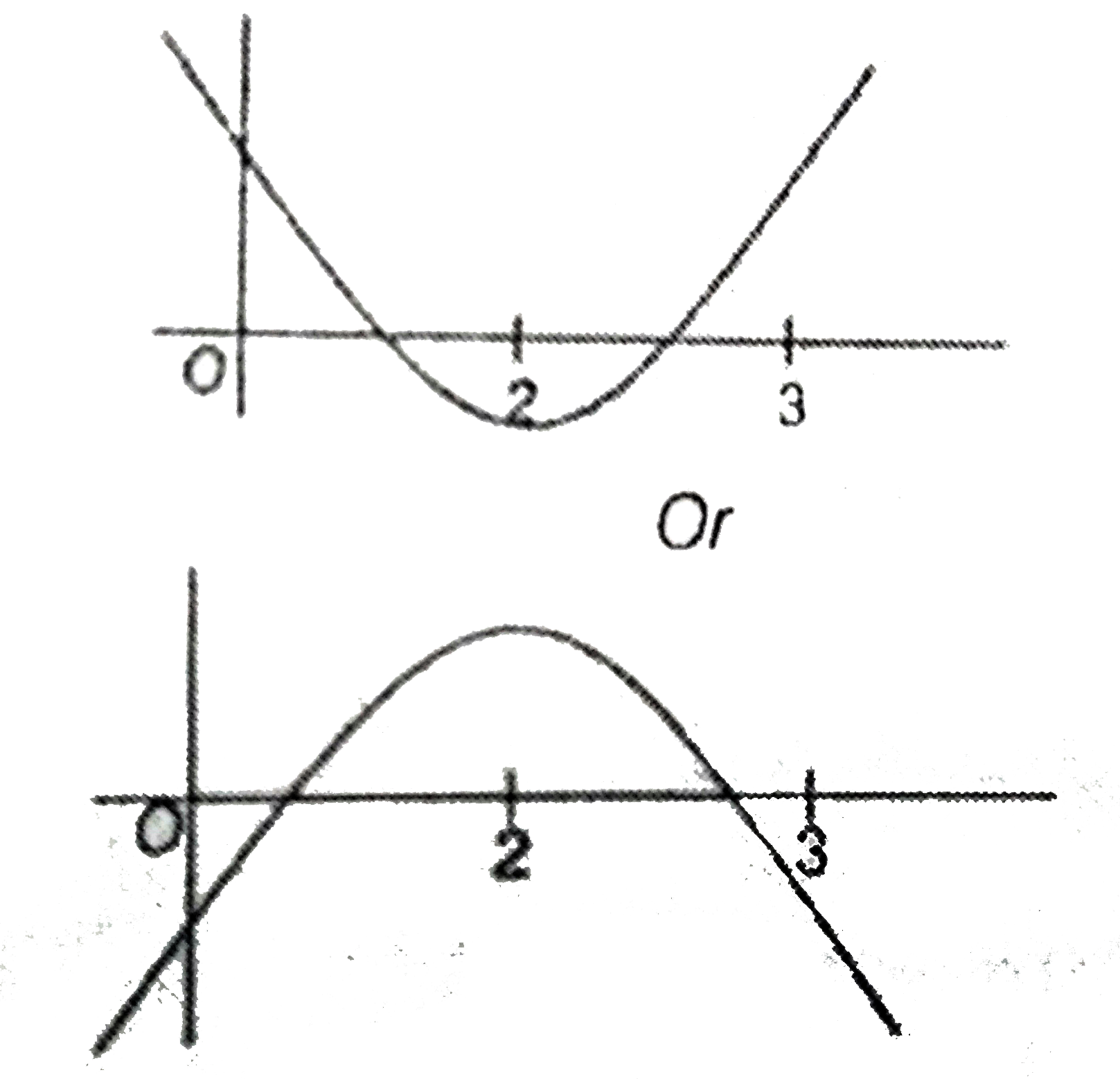Let the quadratic equation (c−5)x2−2cx+c−4=0 has one root in (0,2) and other root in (2,3) then find the number of intergral values of c in solution set (a) 18 (b) 12 (c) 11 (d) 10
A
11
B
10
C
12
D
18
Video Solution
Text Solution
The correct Answer is:A
Let f(x)=(c−5)x2−2cx+(c−4)=0.
Then, according to problem, the graph of g=f(x) will be either of the two ways, show below.

In both cases f(0).f(2)<0andf(2)f(3)<0
Now, consider f(0)f92)<0
⇒(c−4)[4(c−5)−4c+(c−4)]<0
⇒(c−4)(c−24)<0
⇒c∈(4,24) ...(i)

Similiarly, f(2).f(3)<0
⇒[4(c−5)−4c+(c−4)]
[9(c−5)−6c+(c−4)]<0
⇒(c−24)(4c−49)<0

⇒c∈(494,24) ...(ii)
From Eqs. (i) and (ii), we get
c∈(494,24)
∴ Integral vaues of c are 13,14 ....., 23, Thus, 11 integral values of c are possible.
|
Updated on:21/07/2023
Topper's Solved these Questions
- BOOK - IIT JEE PREVIOUS YEARCHAPTER - THEORY OF EQUATIONSEXERCISE - SOME SPECIAL FORMS18videos
THEORY OF EQUATIONS
- BOOK - IIT JEE PREVIOUS YEARCHAPTER - THEORY OF EQUATIONSEXERCISE - TRANFRORMATION OF ROOTS2videos
THEORY OF EQUATIONS
- BOOK - IIT JEE PREVIOUS YEARCHAPTER - STRAIGHT LINE AND PAIR OF STRAIGHT LINESEXERCISE - GENERAL EQUATION OF PAIR OF STRAIGHT LINES (Objective Questions I) (Only one correct option)1videos
STRAIGHT LINE AND PAIR OF STRAIGHT LINES
- BOOK - IIT JEE PREVIOUS YEARCHAPTER - TRIGONOMETRICAL EQUATIONSEXERCISE - TOPIC 3 PROBLEMS BASED ON MAXIMUM AND MINIMUM OBJECTEIVE QUESTIONS I (ONLY ONE CORRECT OPTION)9videos
TRIGONOMETRICAL EQUATIONS
Similar Questions
Knowledge Check
- Question 1 - Select One
The roots of the equation
(a+c−b)x2−2cx+(b+c−a)=0 areA1,2ca+c−bB1,b+c−aa+c−bC1,b+c−a2cD1,a+c−bb+c−a - Question 2 - Select One
If the roots of 10x3−cx2−54x−270 are in harmonic progression, then find c and all the roots.
A2B6C9Dnone of these - Question 3 - Select One
If the quadratic equations, ax2+2cx+b=0andax2+2bx+c=0(b≠c) have a common root, then a+4b+4c is equal to: a. -2 b. -2 c. 0 d. 1
A−2B−1C0D1
If one root of the quadratic equation x2+6x+2=0 is, 23 then find the other root of the equation.
View SolutionIf one root of the quadratic equation ax2+bx+c=0 is 15+2√56 and a,b and c are rational, then find the quadratic equation.
View SolutionThe roots of the quadratic equation (a+b−2c)x2+(2a−b−c)x+(a−2b+c)=0 are
View SolutionIf a+b + c = 0, then show that the quadratic equation 3ax2+2bx+c=0 has at least one root in [0,1].
View Solutionthe quadratic equation x2−9x+3=0 has roots αandβ. If x2−bx−c=0 has roots α2andβ2 then (b,c)is
View Solution

